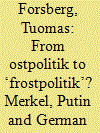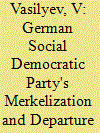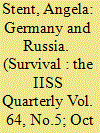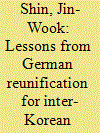| Srl | Item |
| 1 |
ID:
145263


|
|
|
|
|
| Summary/Abstract |
Germany's relationship with Russia has historically been one of the most crucial in shaping Europe's fate. Despite radical transformation in the nature of European Great Power politics, it continues to be pertinent from the perspective of today's world. Germany's willingness to establish good relations with the Soviet Union in the late 1960s—its emphasis on economic relations and cooperation instead of political disagreements—prepared the ground for the end of the Cold War and German unification twenty years later. Germany's basic policy towards Russia remained broadly unchanged despite German unification and changes in the domestic political coalitions and leadership, sometimes against political expectations. In the European context, Germany's attitude towards Russia created the backbone of EU–Russia relations. During 2012–13, however, the continuity in Germany's policy towards Russia was seen as having come to an end. Political twists came to the fore and the atmosphere was loaded with tensions, made worse by the Ukrainian crisis. This article reviews the recent, alleged changes in Germany's policy towards Russia during the Merkel era. It asks two basic questions: first, whether Germany's policy really has changed and if it has, what are the theoretical tools that give us the best potential understanding of these changes? The article argues that the policy has changed, but not as dramatically as made out by some headlines. Moreover, the article suggests that a key element in analysing the degree of change in Germany's policy towards Russia is neither the external power relations nor domestic politics and related changes in the prevailing interpretation of national interest, though these are important too, but the interaction between the leaders and foreign policy elites.
|
|
|
|
|
|
|
|
|
|
|
|
|
|
|
|
| 2 |
ID:
163623


|
|
|
| 3 |
ID:
187255


|
|
|
|
|
| Summary/Abstract |
Following Russia’s invasion of Ukraine, German Chancellor Olaf Scholz appeared to jettison 50 years of Ostpolitik by pledging financial and military support for Ukraine, sanctioning Russia and promising to spend more on defence. Seven months into the war, progress on the German Zeitenwende (turning point) is mixed. Germany has sustained far-reaching sanctions and is grappling with weaning itself off Russian energy, but military deliveries to Ukraine have been slow. The German public continues to support Ukraine, but as winter approaches that support could erode, since Russia has tied future gas deliveries to the lifting of sanctions.
|
|
|
|
|
|
|
|
|
|
|
|
|
|
|
|
| 4 |
ID:
128741


|
|
|
|
|
| Publication |
2014.
|
| Summary/Abstract |
In this article I present competing patterns of discursive reconstruction of German reunification in South Korean public spheres and the methods of mobilizing them for domestic debates on inter-Korean relations. I analyze the editorials and opinion articles of two newspapers, Chosun Daily and Hankyoreh, which respectively represent the most influential conservative and progressive print media in South Korea. The articles not only discuss German reunification in contrasting ways but also integrate those interpretive schemes into policy advocacy on North Korea. The conservatives utilized the narratives about the breakdown of the East German regime and the subsequent unification to justify an aggressive policy toward North Korea, whereas progressives consistently judged the German case as "unification by absorption," giving full support to reconciliation and peaceful coexistence.
|
|
|
|
|
|
|
|
|
|
|
|
|
|
|
|